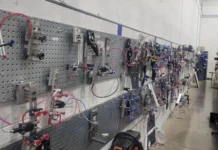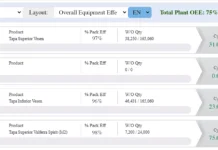by Jen Clark, Plastics Business
Since the 1990s, lean manufacturing has gained a foothold in companies across the US. This methodology provides companies with a means to deliver quality products on time and at least cost. There are several lean manufacturing initiatives, but one of the first business models that companies typically introduce is called 5S – a system designed to reduce waste and optimize productivity through maintaining an orderly workplace. It involves five pillars, which are Sort, Set in Order, Shine, Standardize and Sustain.
In the daily work of a company, routines that maintain organization and orderliness are essential to a smooth and efficient flow of activities, a US Environmental Protection Agency fact sheet notes. Benefits to companies that utilize the 5S methodology include raising quality, lowering costs, promoting safety, building customer confidence, increasing factory up-time and lowering repair cost.
Two Manufacturers Association of Plastics Processors (MAPP)-member companies shared with Plastics Business what they’ve done to go beyond 5S and engage their employees to make their respective businesses better.
Ironwood Plastics, Inc. sets clear goals
For 35 years, Ironwood Plastics has provided full tooling and engineering capabilities to complement the injection molding service that comprises the majority of the company’s work. Ironwood Plastics is known for its expertise and quality in insert molding, continuous molding and over molding. The company has two divisions, located in Ironwood, Michigan, and Two Rivers, Wisconsin – the latter of which opened in 1987. Both divisions currently are experiencing growth and expanding into second facilities.
Lynn Caruso-Stueck, director of operations, said Ironwood implemented 5S in 2009. “It has helped us by reducing waste and allowing us to increase productivity by maintaining an orderly workplace,” she said. The process of incorporating 5S into the workplace began with communication and training, “so our workforce was ready to embrace the change once it was set in motion.” Employees needed to know exactly why the changes were taking place, she added. “This got people excited about becoming part of the teams that were utilized for the different stages of 5S implementation. All employees were asked and encouraged to participate in some way.”
Setting clear goals and expectations helped. “We did this by defining a clear vision, identifying our main objectives (acquiring new projects and customers that support profitable growth; launching only new projects that are production-ready; running and shipping only good parts; and eliminating non-value-added-time and waste everywhere it exists) and identifying a group of guiding principles that set the expectations for all employees,” she said, noting those guiding principles were respect, trust, excellence, communication and teamwork. “We then encouraged and empowered employees to become actively involved in attaining the goals by creating continuous improvement projects at multiple levels throughout the organization.”
PMC SMART Solutions utilizes bonus system
Headquartered in Cincinnati, Ohio, PMC SMART Solutions has locations in Shelbyville, Indiana, and Detroit, Michigan, with affiliated operations in Guanajuato, Mexico, and Wiesau, Germany. Since 1929, it has pioneered new, innovative technologies to meet customers’ growing needs for precision plastic components in the automotive, commercial electronic device and medical device industries.
Shelly Carter, human resources manager, said her company has been utilizing 5S for at least eight years. “It drives continuous improvement,” she said. “The (work) environment will become more predictable, the employees will begin to own the processes, your culture will change in a positive way and the workplace will become a safer environment for everyone. If done correctly, you will become more profitable due to having less waste.”
One way that PMC engaged its employees was through a Continuous Improvement Bonus (CIB) Program. “It was one of the most effective ways to engage our hourly staff members to strive to meet and exceed our stakeholders’ expectations,” she said. “The program has six metrics that are measured monthly and paid to employees on a quarterly basis. The metrics are: Parts Per Million (PPM), Internal Parts Per Million (IPPM), On Time Delivery (OTD), 5S, Labor Efficiency (LE) and Continuous Improvement (CI).”
“Eligible hourly employees receive a quarterly CIB based on meeting five of the six metrics,” Carter explained. Each metric has a goal that must be met each month to receive the full or partial value. The funds are distributed among the employees who have met attendance, quality and efficiency standards. “Usually, a little over 90 percent of the hourly employees are eligible each quarter to receive bonuses,” she said. “We hold CI (the final metric) until year end to pay a larger bonus.”
“Change is foreign”
Creating a work culture and environment that focuses on employee engagement benefits the individual as well as the business, but it isn’t always easy. “Change is foreign,” Carter said. “Change generally is not embraced. A strategy that we’ve adopted is to involve the team from the change-planning phase. This helps the implementation to be much more successful. Realistically, not everyone jumps on board, but most people are okay with change as long as they have a voice’ in the process.”
Engaging employees in this effort is a key to the 5S methodology’s success. Employee engagement also can be a predictor of company success. “Employee involvement is critical to our success as a company,” Caruso-Stueck said. “The involvement increases ownership and commitment, helps us retain the best employees and creates an environment in which people choose to be motivated and contributing.”
Carter agreed. “Employee involvement is the key to our long-term success,” she said. “We believe that old saying: ‘If we always do what we have always done, we will always get what we always got.’ We challenge our employees to continually look for smarter, faster, better, safer and more efficient ways of doing things. We constantly strive to move forward. We have (created) employee committees for safety, scrap, continuous improvement implementation, etc.”
Ironwood Plastics created an environment where all employees were encouraged to contribute their skills, talents and ideas to a continuous process of improvement and innovation. “Employees are encouraged to identify gaps in ideal conditions and empowered to work toward improving those gaps,” Caruso-Stueck explained. “Changes are communicated through monthly plant meetings, monthly team meetings and individual monthly/quarterly performance agreements.”
Measuring employee satisfaction
Engaging employees through 5S isn’t the only way to drive plant improvements. Companies that engage their employees find their workforce is more productive, drive higher levels of profitability, are more customer-focused and have employees who are less likely to jump ship, according to research by Gallup and other organizations. Programs that specifically address skill development and career advancement have been shown to have a dramatic impact on employee engagement, as well as retention of critical talent.
At Ironwood, Caruso-Stueck said employee satisfaction is formally measured through an annual quality of work life survey that focuses on communication, teamwork, pay and benefits, training and education, leadership and supervision, opportunity, interpersonal relationships, working conditions and recognition. In addition, “performance reviews and performance agreements are utilized with all employees,” she said. “These tools are used with the employee to identify growth and skill development opportunities.”
PMC SMART Solutions doesn’t have a formal method to measure employee satisfaction, but rather utilizes quarterly plant-wide communication meetings, wellness challenges/programs, educational programs and community outreach to gauge employee involvement. Carter said through communication, “the employees understand how they make a difference, how what they do daily affects business – good or bad. They understand material variance, labor variance and scrap dollars. They understand each day if they met standard, and if their shift made money or was in the ‘red.’ They care, and they have a pride in their work.”
Health and wellness initiatives at PMC include wellness challenges, such as walking, “Biggest Loser” and stretching bands. “We also have various lunch-and-learn sessions, and we provide fruit and granola bars,” Carter added. But, the key to future growth for the company is its educational initiatives. “We have partnered with Ivy Tech to offer programs locally in Robotics Technology, Maintenance Technology and Tooling Technology,” she said. “We have multiple trainers on staff offering a variety of training from quality to leadership. What we can’t provide in-house we will outsource because we believe our staff makes the difference.”
As for community outreach, Carter has taken on a large role in this arena. “PMC is a mid-sized company with limited resources,” she said. “Part of my role in human resources has been to develop PMC into an employer of choice in our area and create programs that will be sustainable.” She has done this by sitting in on meetings with economic development committees, local educational programs, the mayor’s office and “anywhere else I could to find people who would listen to the needs of business,” she said.
Carter also became part of a growing local education network through which she and other members advocate for programs that will provide the skills and knowledge potential employees should have to be hired at their companies. “The skills gap in America is real, but we can change it one community at a time,” she said.
Both Ironwood and PMC SMART Solutions took the 5S methodology and made it their own. Beyond standardizing their workflow and creating a safer work environment, the companies have increased productivity and reduced manufacturing costs. “These improvements have allowed us to pass along savings to our customers and improve both employee and customer satisfaction,” Caruso-Stueck said.
Added Carter: “We just completed our TS16969 audit, and the lead auditor commented on our 5S system. He said he could walk up to any work station and find everything in the same order, color coded, charted and organized; the plant was clean, presses neatly aligned and equipment organized as well. This is the same every day – not just on audit or customer visit day!”




